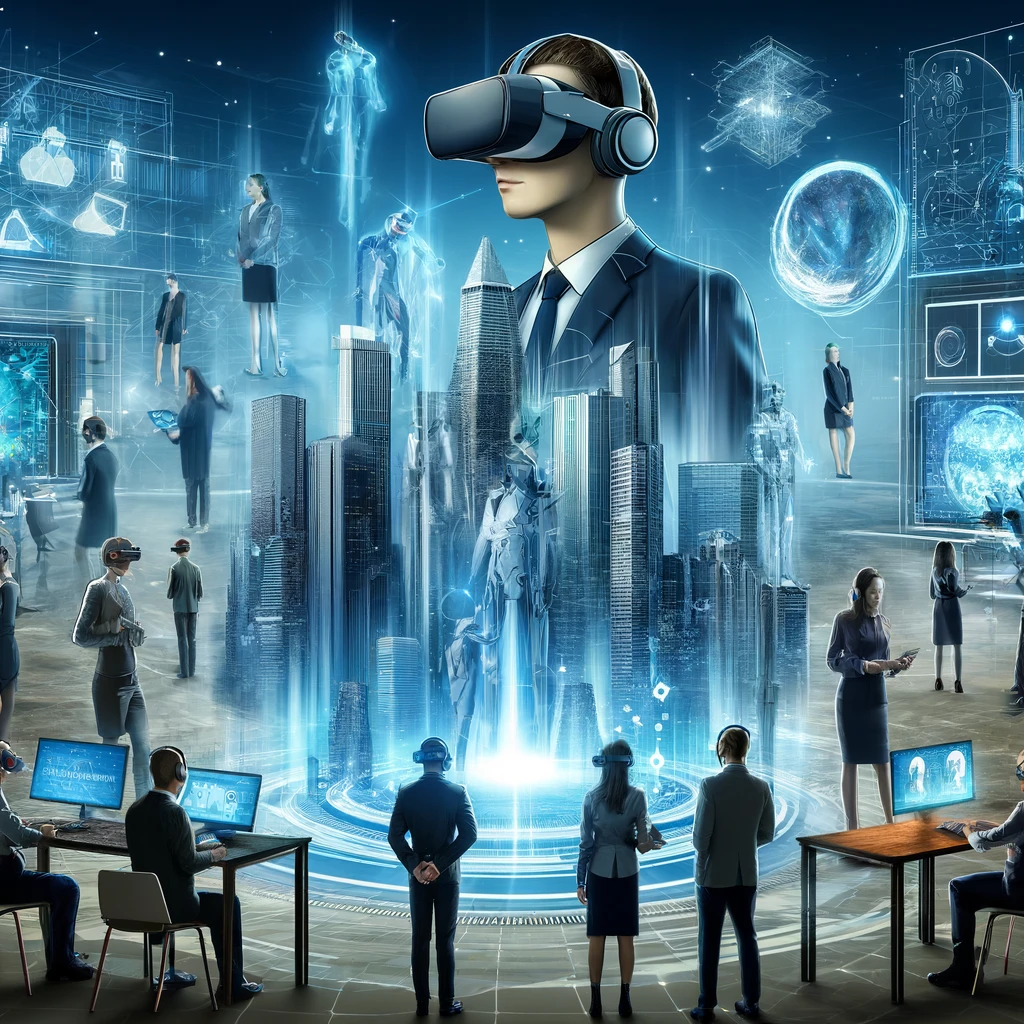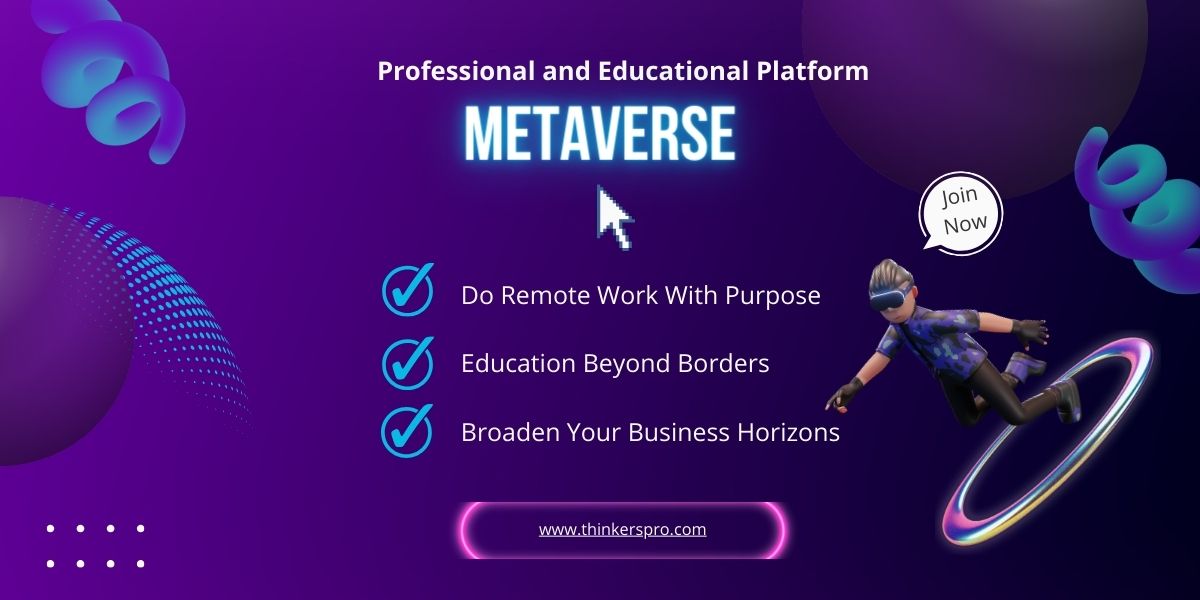Why is the Metaverse Important for Corporates?
For corporates, the Metaverse presents unprecedented opportunities for innovation, engagement, and growth. Here are some key reasons why it holds immense significance for businesses:
1. Enhanced Customer Engagement
With the Metaverse, companies can offer their customers immersive experiences. Virtual showrooms, interactive product demonstrations, and gamified marketing strategies can provide deeper engagement and personalized interactions. This leads to enhanced customer loyalty and satisfaction.
2. New Revenue Streams
The Metaverse allows businesses to create new forms of digital assets and services. Virtual goods, NFTs (non-fungible tokens), and virtual real estate are some examples where companies can invest and generate additional revenue. As the Metaverse economy grows, these digital assets increase in importance.
3. Remote Collaboration
The Metaverse offers a revolutionary approach to remote work and collaboration. Virtual offices and meeting spaces promote more engaging and interactive work environments. This way, teams from around the world can cooperate effectively and feel more connected, irrespective of physical distance.
4. Market Expansion
In the Metaverse, geographical limitations dissolve, allowing businesses to tap into global markets effortlessly. Companies can provide services and sell products to a worldwide customer base without the constraints of physical location. Thus, expanding their market reach exponentially.
How Are Companies Adopting the Metaverse for Business Operations?
What Is the Metaverse?
The Metaverse is a collective virtual shared space, created by the convergence of virtually enhanced physical reality and physically persistent virtual reality. It encompasses augmented reality (AR), virtual reality (VR), and other emerging technologies. The Metaverse creates a network of 3D virtual worlds focused on social connection.
How Are Companies Using the Metaverse for Training and Collaboration?
One key adoption area is employee training and collaboration. Companies use VR to simulate real-world scenarios, providing hands-on training in a risk-free environment. With AR, employees can access real-time information overlaid on physical objects, aiding in fields like manufacturing and healthcare.
For collaboration, immersive virtual meetings and workspaces offer an engaging alternative to traditional video calls. Employees can gather in a 3D environment, manipulate virtual objects, and share experiences despite being geographically dispersed.
What Role Does the Metaverse Play in Marketing and Customer Engagement?
Businesses utilize the Metaverse to enhance marketing and customer engagement through interactive experiences. Virtual showrooms and product demonstrations allow customers to explore products in a dynamic, engaging manner. Retailers host virtual events and fashion shows, attracting a tech-savvy audience.
- Virtual Try-Ons: Customers can try on clothes, accessories, or even test furniture arrangements in their homes.
- Branded Virtual Worlds: Companies create their own branded spaces, establishing a unique and immersive brand presence.
- Interactive Ads: Advertisements within the Metaverse provide an interactive component, making them more engaging and memorable.
How Are Companies Leveraging the Metaverse for Product Development and Prototyping?
The Metaverse aids in product development and prototyping by enabling companies to build and test virtual models before physical production. Engineers and designers can collaborate in real-time, making adjustments on the fly. This approach significantly reduces time and costs associated with creating physical prototypes.
By utilizing virtual environments, businesses can visualize products in different settings and gather feedback from testers worldwide. This not only speeds up the development cycle but also allows for more innovative and user-centered design processes.
How Is the Metaverse Impacting E-commerce?
E-commerce is experiencing a transformation with the integration of the Metaverse. Virtual storefronts offer a unique shopping experience where customers can interact with products in 3D. This enhances product understanding and customer satisfaction.
Moreover, social commerce within the Metaverse enables users to shop with friends, attend live sales events, and receive personalized recommendations. These advancements make online shopping more interactive and enjoyable.
How Can the Metaverse Enhance Customer Engagement?
The metaverse offers a unique platform for corporations to significantly enhance customer engagement. By creating immersive and interactive experiences, businesses can provide customers with a more engaging and personalized experience. Virtual showrooms, product demonstrations, and even virtual customer service agents are just a few ways to leverage the potential of the metaverse. This level of interaction helps to build stronger customer relationships and increases brand loyalty.
What Opportunities Does the Metaverse Provide for Remote Work and Collaboration?
One of the most significant benefits of the metaverse for corporations is the enhancement of remote work and collaboration. Virtual offices and meeting spaces enable employees to interact as if they were in the same physical location, fostering better teamwork and collaboration. Tools like virtual whiteboards and collaborative environments streamline project management and decision-making processes, making remote work more efficient and effective.
How Can Companies Leverage the Metaverse for Marketing and Branding?
The metaverse offers innovative opportunities for marketing and branding. Companies can create virtual events, product launches, and interactive brand experiences that reach a global audience. **Brand marketers** can utilize **virtual billboards**, **sponsored content**, and **product placements** within virtual worlds to increase visibility and engagement. Additionally, the metaverse allows for the collection of vast amounts of data on customer behavior, which can be used to refine and target marketing strategies more effectively.
What Are the Potential for New Revenue Streams with the Metaverse?
The metaverse opens up avenues for new revenue streams for corporations. Businesses can create and sell virtual goods and services, offer virtual real estate, and even hold virtual events with ticketed admissions. The gaming and entertainment sectors, in particular, are seeing substantial growth in this area. Moreover, companies can engage in **virtual commerce**, enabling customers to purchase physical and digital products within the metaverse environment, expanding their market reach.
How Does the Metaverse Improve Employee Training and Development?
Employee training and development can be significantly improved in the metaverse. **Virtual simulations** and **interactive training modules** provide employees with a hands-on, immersive learning experience that traditional methods cannot match. This type of training is especially beneficial for complex tasks and can lead to better retention of information and skills. Additionally, employees can access these training resources from anywhere, ensuring equal opportunities for development regardless of geographic location.
What Are the Cost-Effectiveness and Efficiency Gains from Metaverse Adoption?
Corporations can achieve significant cost savings and efficiency gains by adopting the metaverse. Virtual meetings and events reduce the need for travel, thereby lowering travel expenses and reducing the carbon footprint. Moreover, virtual environments can reduce the need for physical office space, leading to further cost savings. The **efficiency** of **virtual project collaboration tools** and **automated processes** within the metaverse can also accelerate workflows and reduce operational costs.
What Challenges Do Corporates Face When Entering the Metaverse?
The metaverse is a complex digital environment that requires high-end technology and expertise. For corporates, adapting to these technological requirements can be a significant challenge. They need advanced hardware and software infrastructures to create immersive experiences. Additionally, integrating 3D modeling and virtual reality (VR) elements demands skilled personnel and extensive training.
Moreover, ensuring seamless user experience (UX) involves overcoming slow internet speeds and latency issues. The constant need to update and maintain the technology to match the rapidly evolving metaverse standards adds to the complexity. Many corporates find themselves behind the curve without continuous investment in R&D.
[aib_post_related url=’/metaverse-as-a-corporate-showroom/’ title=’Metaverse as a corporate showroom’ relatedtext=’Quizás también te interese:’]
What Are the Financial Implications for Corporates Entering the Metaverse?
Another significant challenge is the financial investment required to venture into the metaverse. Developing a presence in this space involves substantial upfront costs for technology, talent acquisition, and marketing. Additionally, maintaining a virtual presence involves ongoing expenditures that can strain budgets.
Corporates need to balance the potential revenue from metaverse ventures against these high initial and recurring expenses. Moreover, there is the risk element, as the metaverse is still an emerging market with uncertain returns on investment. This financial uncertainty can make it challenging for companies to justify the hefty expenditures required.
How Do Corporates Address Security and Privacy Concerns in the Metaverse?
Security and privacy are critical concerns for corporates entering the metaverse. Protecting user data within these virtual environments is paramount, as any breach can lead to significant reputational damage and financial loss. Ensuring robust cybersecurity measures is essential to prevent such breaches.
Additionally, navigating privacy regulations can be complex due to varying laws across different jurisdictions. Corporates must develop comprehensive strategies to comply with these regulations while maintaining user trust. This involves implementing stringent data protection protocols and continuously monitoring for potential threats.
What Legal and Regulatory Challenges Do Corporates Face in the Metaverse?
The legal landscape of the metaverse is still evolving, which poses significant challenges for corporates. Issues such as intellectual property rights, contract enforcement, and virtual property ownership are areas that require careful management. Companies must navigate a maze of legal frameworks to ensure compliance.
Moreover, as the metaverse expands, new laws and regulations will likely emerge. This continual evolution requires corporates to stay updated on legal changes and adapt their strategies accordingly. Legal uncertainty can deter companies from fully investing in metaverse projects, adding another layer of complexity to their entry into this new frontier.
Case Studies: Successful Metaverse Implementations in Corporates
The metaverse is an expansive virtual world facilitated by advanced technologies such as AI, virtual reality (VR), and augmented reality (AR). Corporates are leveraging the metaverse for several innovative applications including virtual meetings, product demonstrations, employee training, and customer engagement. These implementations are expanding the boundaries of traditional business operations, creating more immersive and interactive experiences.
How Did Company X Implement the Metaverse for Employee Training?
Company X, a leading tech firm, successfully incorporated the metaverse into their employee training programs. They developed a virtual campus, accessible through VR headsets, where new employees can undergo a comprehensive onboarding process. The virtual campus includes:
- Interactive training modules
- Simulated real-world scenarios
- Practice environments for hands-on skills
This approach has significantly increased engagement and knowledge retention, showing a measurable improvement in employee performance.
How Does Company Y Use the Metaverse for Customer Engagement?
Company Y, a global fashion retailer, has implemented the metaverse to enhance customer engagement and transform the shopping experience. They launched a virtual store where customers can:
- Explore new collections in 3D
- Interact with virtual sales assistants
- Customize and try on outfits in a virtual fitting room
This innovative approach has not only increased customer satisfaction but also driven higher sales conversions and brand loyalty.
What Are the Benefits of Using the Metaverse in Corporate Meetings?
Several corporates are now utilizing the metaverse to conduct virtual meetings, replacing traditional conference calls and video meetings. Key benefits include:
- Enhanced Collaboration: Teams can meet in a virtual environment that fosters creativity and effective brainstorming.
- Global Reach: Employees from across the globe can seamlessly interact without physical or geographical constraints.
- Cost Savings: Reduces the need for travel and physical meeting spaces, leading to significant cost savings.
These virtual meetings also integrate interactive whiteboards and breakout rooms, providing a real-time collaborative experience similar to in-person meetings.
How Did Company Z Improve Product Demonstrations with the Metaverse?
[aib_post_related url=’/metaverso-y-transformacion-digital-educativa/’ title=’Metaverso y transformación digital educativa’ relatedtext=’Quizás también te interese:’]
Company Z, an automotive giant, has integrated the metaverse into their product demonstration strategies. By creating virtual showrooms, customers can:
- Explore car models in great detail
- Customize features and configurations in real-time
- Take virtual test drives
These virtual showrooms have drastically improved customer experience and increased the perceived value of the products, leading to higher sales and customer satisfaction.


